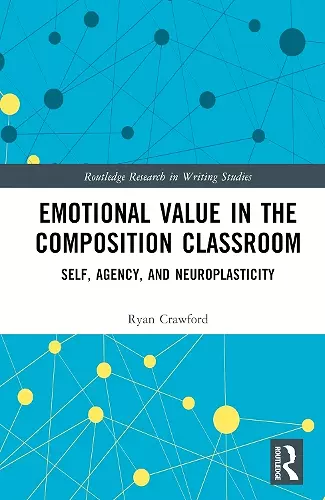Emotional Value in the Composition Classroom
Self, Agency, and Neuroplasticity
Format:Hardback
Publisher:Taylor & Francis Ltd
Published:24th Aug '23
Currently unavailable, and unfortunately no date known when it will be back

Using the concept of "plasticity," or the brain’s ability to change through growth and reorganization, as a theoretical framework, this book argues that encouraging an exploration of the self better establishes emotional value in the composition classroom.
This book explores recent evidence from studies in modern neuroscience to provide biological correlations between current and developing theory and pedagogy in Composition Studies. Starting with the concept of self, each subsequent chapter builds a neurobiological understanding of how emotional value, intrinsic motivation, creativity, and happiness are constructed and felt. This material exploration shows how these factors can maintain motivation, improve long-term memory, encourage creative risk, and initiate complex considerations of being. Recognizing the shift in Composition Studies to posthuman and new materialist methodologies, this modern neuroscience is presented as a useful parallel to—rather than being at odds with—these and other current methodologies, theories, and pedagogies.
Outlining the need for a more student-focused, guided-discovery framework for the composition classroom, this interdisciplinary resource will be of interest to scholars and students in the field of Composition Studies, Communication Studies, Education, Psychology, and Philosophy.
"Written by an emerging scholar in Writing Studies and neuroscience, Ryan Crawford’s book uses the concept of the ‘emergent self’ or the ‘self as becoming’ to provide insight into what happens in the brain during the experience of different types of motivation. The book utilizes an intriguing and unique approach to pedagogy, problematizing and expanding what is meant by a student-centered class. It is likely to have a groundbreaking impact on how we understand teaching, learning, and student agency."
Irene Clark, California State University, Northridge, USA.
"An innovative take on applying the principles of brain science to writing composition. Dr. Crawford provides the reader with an insight into how neuroscience research can have practical applications in the classroom setting."
Michael Hylin, Southern Illinois University-Carbondale, USA.
"Written by an emerging scholar in Writing Studies and neuroscience, Ryan Crawford’s book uses the concept of the ‘emergent self’ or the ‘self as becoming’ to provide insight into what happens in the brain during the experience of different types of motivation. The book utilizes an intriguing and unique approach to pedagogy, problematizing and expanding what is meant by a student-centered class. It is likely to have a groundbreaking impact on how we understand teaching, learning, and student agency."
Irene Clark, California State University, Northridge, USA.
"An innovative take on applying the principles of brain science to writing composition. Dr. Crawford provides the reader with an insight into how neuroscience research can have practical applications in the classroom setting."
Michael Hylin, Southern Illinois University-Carbondale, USA.
“This is a transformative book. Crawford's thoughtful explication of how neuroscience informs first-year composition pedagogy is thorough and convincing. […] The book is meticulously researched and at times complex. […] With a strong emphasis on how students develop and maintain their senses of self, the author provides a thoughtful first-year writing curriculum that is both hopeful and grounded in the latest composition/rhetorical research. This book will be useful for graduate students and professors who want to learn more about how the brain learns to write at the neurobiological level.”
M. Mutschelknaus, Rochester Community and Technical College, USA.
ISBN: 9781032513546
Dimensions: unknown
Weight: 453g
216 pages